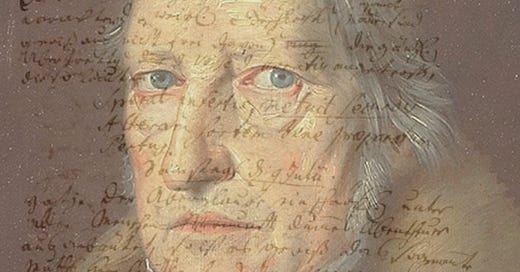Over the last few months, I embarked on a study of the heavyweight German idealist philosopher Georg Wilhelm Friedrich Hegel (1770—1831), inspired by a group of Hegelian provocateurs who call themselves the Dark Renaissance. Hegel remains one of the most influential yet difficult thinkers of modern times. When I read a bit of Hegel in college, I remember that I found his writing to be fascinating, yet curiously impenetrable. My original impression was confirmed once again as I re-engaged with Phenomenology of Spirit, his first book, still considered to be his masterpiece. The difficulties are enormous, punctuated by little euphoric shivers once a particular passage becomes sensible (and, at times, luminous).
Walter Kaufmann put it nicely in Hegel: A Reinterpretation:
“My honeymoon with Hegel is long passed. The discovery that what at first makes no sense is after all by no means meaningless too often leads to joyous assent. The Heidegger vogue is a striking example. But recognition of an author's meaning is one thing, comprehension another. When a philosopher is exceptionally difficult, most readers leave him alone or soon give up. The few who persevere and spend years figuring him out naturally do not like to be experts on something that is not worthwhile.”
I thought it would be worthwhile to put down a few reflections on my own Hegelian honeymoon. I also want to consider what I have gleaned from him as it relates to our current circumstances, before it all reverts back to a blur.
I find it boring and fatiguing to use the word “crisis” again and again. Obviously our world is in “crisis.” We have entered a continual state of emergency—ecologically, geopolitically, and also spiritually—with no foreseeable end in sight. On top of the still-percolating pandemic, the cancerous growth of an omnipresent surveillance and control apparatus, the undermining of American Democracy by an increasingly Neo-Fascist Right Wing, we now have the Ukrainian War with its threats to food and energy security, its barbaric cruelty and instant immiseration of millions, as well as its potential to spiral out of control into nuclear conflict.
In recent years, many contemporary commentators and authors have proclaimed we are in a “meaning crisis,” and tried to offer some panacea for it. This is the basis of Jordan Peterson’s somewhat bizarre rocket-ride to fame (his first book is titled Maps of Meaning). Yuval Noah Harari’s main insight in his bestselling Sapiens is that meaning—belief—is always a human-made concoction. Sam Harris entered the popular consciousness with his book The End of Faith, which argued that religious beliefs are atavistic and, in a time of exponential technology and asymmetric warfare, these must be collectively overcome, somehow, to prevent apocalypse.
Back in the late 18th and early 19th Centuries, Hegel was also seeking to answer the “meaning crisis” of his time. The old justifications of Christian faith were no longer functional in an age of scientific progress and Enlightenment, which was already trending toward the progressive disenchantment of the world. Then there was the blood-drenched failure of the French Revolution, which smashed the hopes of the young generation for political liberation or utopian emancipation.
I find, in fact, Hegel’s work illuminates the intrinsic, often invisible connection that always exists between the ongoing project of philosophy and the legitimacy of the state — a given society’s institutional framework and the principles embedded in its laws, Constitutions, and other founding documents. I would argue that this is the case today just as much as it was in the early 19th Century, although it would take a lot of intellectual heavy-lifting to substantiate this. In essence, any social or institutional project derives its legitimacy from some conceptual framework. A society or civilization’s metaphysics and its institutions, are in some sense, stitched together. The French and American Revolutions, for example, were inspired by Enlightenment thinkers as well as Free Masonry.
Keep reading with a 7-day free trial
Subscribe to Liminal News With Daniel Pinchbeck to keep reading this post and get 7 days of free access to the full post archives.






